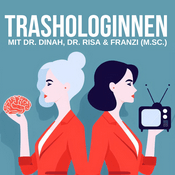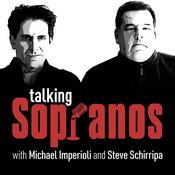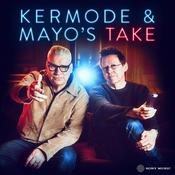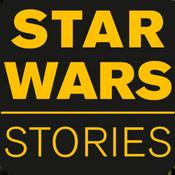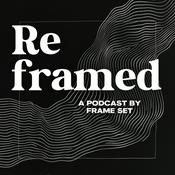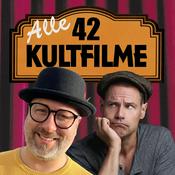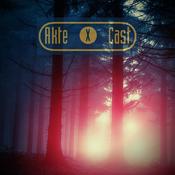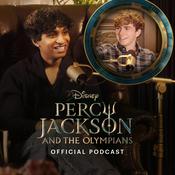Cold War Cinema
Jason Christian, Anthony Ballas, & Paul T. Klein
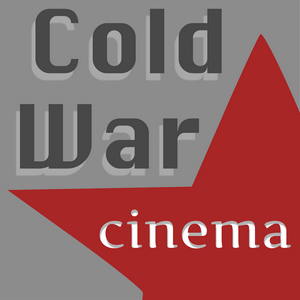
Neueste Episode
31 Episoden
- The Cold War Cinema team returns with special guest Aspen Ballas to discuss John Ford's 1956 western The Searchers. Aspen is a PhD student of English at the University of North Carolina at Chapel Hill. Her research primarily focuses on aesthetics of race and class, and the relation between genre, medium, and politics.
Synopsis of the film: Texas, 1868. A lone figure approaches a windswept homestead, against a dusty blue sky and flaming red buttes and cathedral-like mesas. Returning from the fight for the Confederacy, Ethan Edwards arrives home to his brother Aaron, Aaron's wife Martha, and to their children Ben, Lucy, little Debbie, and their adopted son Martin Pawley. But this is rough country, and a Comanche raid leaves the Edwards family torn asunder–Aaron, Martha, and Ben dead, and Lucy and Debbie taken captive. For seven years, Ethan and Martin search the vast wilderness, motivated not only by family bonds, but in Ethan's case, bloodlust and wild, racist hatred–a search not only to find Lucy and Debbie, but to enforce racial and sexual purity and to define Americanness itself…
On this episode we discuss:
The American mythmaking in The Searchers and in westerns generally.
John Ford's attempt to critique anti-Indigenous racism, and the limitations of such a critique in the context of Hollywood filmmaking of this era.
Militant Liberty, a top-secret psychological warfare program created by the Pentagon to promote anti-communist themes in Hollywood movies during the Cold War. John Ford was an eager participant in the program.
The broader US imperialist context of the film's release and the historical background of the setting.
_____________________
We love to give book or film recommendations on the podcast, so here are ours for this episode:
Aspen: The Face on Film by Noa Steimatsky; Raoul Peck's docuseries Exterminate all the Brutes (2021)
Paul: The Searchers: The Making of an American Legend by Glenn Frankel
Tony: Unsettled Borders: The Militarized Science of Surveillance on Sacred Indigenous Land by Felicity Amaya Schaeffer
Jason: Versions of Hollywood Crime Cinema: Studies in Ford, Wilder, Coppola, Scorsese, and Others by Carl Freedman
_____________________
Like and subscribe to Cold War Cinema, and don't forget to leave us a review! Want to continue the conversation? Drop us a line at any time at [email protected].
To stay up to date on Cold War Cinema, follow along at coldwarcinema.com, or find us online on Bluesky @coldwarcinema.com or on X at @Cold_War_Cinema.
For more from your hosts and guest:
Follow Aspen on Letterboxed at @aspenballas.
Follow Jason on Bluesky at @JasonAChristian.bsky.social, on X at @JasonAChristian, or on Letterboxed at @exilemagic.
Follow Anthony on Bluesky at @tonyjballas.bsky.social, on X at @tonyjballas, or on Letterboxed at @tonyjballas.
Follow Paul on Bluesky at @ptklein.com, or on Letterboxed at @ptklein. Paul also writes about movies at www.howotreadmovies.com
_____________________
Logo by Jason Christian
Theme music by DYAD (Charles Ballas and Jeremy Averitt).
Happy listening! - The Cold War Cinema team returns to discuss Grigory Chukhray's 1959 war drama Ballad of a Soldier.
Alyhosha is 19-years-old private on the Eastern Front during the Great Patriotic War (A.K.A. World War II). After destroying two German tanks, Alyosha, played by Vladimir Ivashov, is rewarded with a short leave to return home to see his mother and repair her roof. Over the next six days, the young soldier travels home across the countryside, often crossing paths with his countrymen in both mundane and profound ways: A one-legged soldier running from his wife, the wife of another private, found living with another man, and a tender vagabond girl, Shura (Zhanna Prokhorenko), who he meets while hiding out in a rail car. Throughout his quiet picaresque, Alyhosha learns about the sacrifices and tenderness of a nation torn apart by war.
Join hosts Jason Christian, Tony Ballas, and Paul T. Klein as we discuss:
The film's treatment of individualism versus collective responsibility.
The train as a metaphor in both the Soviet and US contexts.
The Soviet romance versus Hollywood romances.
The Soviet treatment of nature and rural spaces in this film and others.
_____________________
We love to give book or film recommendations on the podcast, so here are ours for this episode:
Paul recommends the film The Best Years of Our Lives (1946, William A. Wyler) and the book The Foreign Film Renaissance on American Screens 1946–1973 by Tony Balio.
Tony recommends the book Peasants and Capital: Dominica in the World Economy by Michel-Rolph Trouillot
Jason recommends the film The Forty-First (1956, Grigory Chukhray).
_____________________
Like and subscribe to Cold War Cinema, and don't forget to leave us a review! Want to continue the conversation? Drop us a line at any time at [email protected].
To stay up to date on Cold War Cinema, follow along at coldwarcinema.com, or find us online on Bluesky @coldwarcinema.com or on X at @Cold_War_Cinema.
For more from your hosts:
Follow Jason on Bluesky at @JasonChristian.bsky.social, on X at @JasonAChristian, or on Letterboxed at @exilemagic.
Follow Anthony on Bluesky at @tonyjballas.bsky.social, on X at @tonyjballas.
Follow Paul on Bluesky at @ptklein.com, or on Letterboxed at @ptklein. Paul also writes about movies at www.howotreadmovies.com
_____________________
Logo by Jason Christian
Theme music by DYAD (Charles Ballas and Jeremy Averitt).
Happy listening! - In this bonus episode of Cold War Cinema, Jason Christian is joined by the independent filmmakers Eric Marsh and Christopher Jason Bell, to discuss the films and legacy of the British filmmaker and media theorist Peter Watkins, who died on October 30, 2025, one day after his nintieth birthday. Watkins stands apart in film history for his bold cinematic vision, his innovations of the pseudo-documentary, and for his unflinching cinematic attacks on the mass media and authoritarian states. For these reasons and others, he has never been given his due in the academy or in popular culture. We discuss why this radical filmmaker is so important to us personally, and why his legacy should—and probably will—continue to grow.
_____________________
We love to give book or film recommendations on the podcast, so here are ours for this episode:
Eric recommends the film Bisbee '17 (2018, Robert Greene).
Christopher recommends the film Revolution Selfie (2017, Steven de Castro).
Jason recommends the book Future Revolutions: New Perspectives on Peter Watkins (2018, various authors).
_____________________
Find Eric Marsh's films here.
Find Christopher Jason Bell's work here.
Find our previous interview with Christopher Jason Bell here.
Jason's essay on Punishment Park (1971) is found here. And his short piece on Privilege (1967) is here. (Scroll down.)
_____________________
Like and subscribe to Cold War Cinema, and don't forget to leave us a review! Want to continue the conversation? Drop us a line at any time at [email protected].
To stay up to date on Cold War Cinema, follow along at coldwarcinema.com, or find us online on Bluesky @coldwarcinema.com or on X at @Cold_War_Cinema.
And for more from your hosts:
Follow Jason on Bluesky at @JasonChristian.bsky.social, on X at @JasonAChristian, or on Letterboxed at @exilemagic.
Follow Anthony on Bluesky at @tonyjballas.bsky.social, on X at @tonyjballas.
Follow Paul on Bluesky at @ptklein.com, or on Letterboxed at @ptklein. Paul also writes about movies at www.howotreadmovies.com
_____________________
Logo by Jason Christian
Theme music by DYAD (Charles Ballas and Jeremy Averitt).
Happy listening! - "They're here already! You're next! You're next! You're next!"
The Cold War Cinema team returns to discuss the 1956 sci-fi classic Invasion of the Body Snatchers. Something is off in the sleepy little town of Santa Mira, California. As residents begin worrying that their family and friends no longer seem to be who they say they are, Dr. Miles Bennell and his former flame Becky Driscoll slowly uncover an alien plot to replace every person on earth with otherworldly duplicates. Directed by Don Siegel (Riot on Cell Block 11, Dirty Harry, Escape from Alcatraz) and written by Daneil Mainwaring (Out of the Past), and with uncredited work by blacklisted screenwriter Richard Collins (Song of Russia), Invasion explores myriad maladies in midcentury American culture.
Join hosts Jason Christian, Tony Ballas, and Paul T. Klein as we discuss:
The many complicated—and often contradictory—political allegories often read into the film from both the left and the right, including anti-communist and anti-conformist messages.
The political and discursive handwringing done by Invasion's creative team to distance themselves and the film from its most potent politics.
Invasion's other formal and narrative critiques of psychoanalysis, middle-class nuclear family values, professional expertise, and the Hollywood studio system.
Why movies are not riddles to be solved.
_____________________
We love to give book or film recommendations on the podcast, so here are ours for this episode:
Paul recommends Halloween III: Season of the Witch (1982, Tommy Lee Wallace).
Tony recommends, The Burbs (1989, Joe Dante).
Jason recommends No Down Payment (1957, Martin Ritt).
_____________________
Like and subscribe to Cold War Cinema, and don't forget to leave us a review! Want to continue the conversation? Drop us a line at any time at [email protected].
To stay up to date on Cold War Cinema, follow along at coldwarcinema.com, or find us online on Bluesky @coldwarcinema.com or on X at @Cold_War_Cinema.
For more from your hosts:
Follow Jason on Bluesky at @JasonChristian.bsky.social, on X at @JasonAChristian, or on Letterboxed at @exilemagic.
Follow Anthony on Bluesky at @tonyjballas.bsky.social, on X at @tonyjballas.
Follow Paul on Bluesky at @ptklein.com, or on Letterboxed at @ptklein. Paul also writes about movies at www.howotreadmovies.com
_____________________
Logo by Jason Christian
Theme music by DYAD (Charles Ballas and Jeremy Averitt).
Happy listening! - This week on Cold War Cinema, we look at Boris Barnet's Poet (sometimes refered to as The Poet), a 1956 feature about the role of art and literature in war and revolution.
Join hosts Jason Christian, Tony Ballas, and Paul T. Klein for a broad-ranging conversation about the film and the politics of form and style. Throughout, we consider:
The challenges of context-dependent domestic filmmaking and international spectatorship
How film narrative and aesthetic modes like Socialist Realism participate in the construction of national myths, imaginaries, and ideologies
Barnet's dynamic use of framing, blocking, color, and light to advance Poet's plot and politics
_____________________
We love to give book or film recommendations on the podcast, so here are ours for this episode:
Paul recommends A History of Russian Cinema by Birgit Beumers.
Tony recommends, The Common Wind: Afro-American Currents in the Age of Haitian Revolution by Julius S. Scott. Tony emphatically does not recommend Literature and Revolution by Leon Trotsky.
Jason recommends Miklós Janscó's 1967 Hungarian war film, The Red and the White.
_____________________
Like and subscribe to Cold War Cinema, and don't forget to leave us a review! Want to continue the conversation? Drop us a line at any time at [email protected].
To stay up to date on Cold War Cinema, follow along at coldwarcinema.com, or find us online on Bluesky @coldwarcinema.com or on X at @Cold_War_Cinema.
For more from your hosts:
Follow Jason on Bluesky at @JasonChristian.bsky.social, on X at @JasonAChristian, or on Letterboxed at @exilemagic.
Follow Anthony on Bluesky at @tonyjballas.bsky.social, on X at @tonyjballas.
Follow Paul on Bluesky at @ptklein.com, or on Letterboxed at @ptklein. Paul also writes about movies at www.howotreadmovies.com
_____________________
Logo by Jason Christian
Theme music by DYAD (Charles Ballas and Jeremy Averitt).
Happy listening!
Weitere TV und Film Podcasts
Trending TV und Film Podcasts
Über Cold War Cinema
Cold War Cinema is a podcast about movies made during the first few decades of the Cold War (1947–1991). Each episode primarily focuses on one film, and the hosts, Jason Christian and Anthony Ballas, discuss the director's life and work, the historical context of the film, and examine its themes that relate to the turbulent politics of the era.
Theme music and editing on the first 14 episodes by Tim Jones; theme music from then on by DYAD (Charles Ballas and Jeremy Averitt), and editing by Jason Christian.
Logo by Jason Christian
Podcast-WebsiteHöre Cold War Cinema, Trashologinnen - Reality-TV psychologisch analysiert und viele andere Podcasts aus aller Welt mit der radio.de-App

Hol dir die kostenlose radio.de App
- Sender und Podcasts favorisieren
- Streamen via Wifi oder Bluetooth
- Unterstützt Carplay & Android Auto
- viele weitere App Funktionen
Hol dir die kostenlose radio.de App
- Sender und Podcasts favorisieren
- Streamen via Wifi oder Bluetooth
- Unterstützt Carplay & Android Auto
- viele weitere App Funktionen


Cold War Cinema
Code scannen,
App laden,
loshören.
App laden,
loshören.

